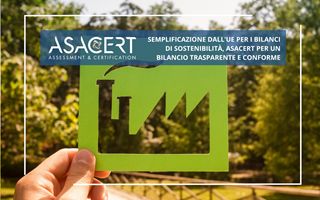(Finance) – Close to the holidays, companies receive a gift from the European Commission: a document that provides new directives for all organizations that will have to publish their sustainability reporting and protect themselves from greenwashing practices. These are indications that help companies overcome the practical difficulties in adopting the Corporate Sustainability Reporting Directive (CSRD) and ensure that these are uniformly respected by all Member States. ASACERT will take stock, together with TreeBlockon these latest innovations and on the prospects for applying the new procedures to the event “Sustainability Report: transparency and credibility of data. An EcoDigital challenge”, which will be held next January 14th at 4.30pm at Palazzo Bocconi – W Executive in Milan. An event organized by UniVerde Foundation and from Ecodigital network, in which we will talk about sustainability reports and how it is necessary to promote more transparent, uniform and reliable reporting throughout Europe.
Just as pointed out by President of the EU Commission Ursula Von Der Leyenthe current regulations are not homogeneous for all countries, and the succession of legislative interventions over the years has given rise to regulatory overlaps that complicate application. For this reason, the Commission has predicted that by mid-2025 it will present proposals to reduce reporting obligations at least 25% to make the regulatory framework simplified and uniform, in particular that relating to SMEs, designed to lighten bureaucracy and ensure that all companies, regardless of their size, can comply with the same reporting system.
In fact, starting from 2025, the number of companies subject to the obligation to draw up sustainability reports will expand: it will concern companies with a number of employees exceeding 250 units and/or with a turnover equal to 40 million in turnover and/or or 20 million total assets.
All other businesses will follow.
Main provisions on regulations and reporting obligations
The European Commission document addresses several crucial aspects of how companies will have to comply with greater transparency on ESG (environmental, social and governance) risks. Central point concerns the European Sustainability Reporting Standards (ESRS), developed byEuropean Financial Reporting Advisory Group (EFRAG) and sustainability reporting benchmark, which establish the rules for collecting and presenting ESG data. The standards are adapted to the specificities of each sector and different company sizes. In this regard, answers to the most frequently asked questions will be reported. Among the main innovations introduced there is also the obligation to digitize sustainability reports. This measure aims to make data more easily accessible and compatible with different IT systems. Digitalisation will also enable faster and more precise analysis by investors, regulators and other stakeholders. Thanks to digitalisation, it will also be easier to monitor the progress of companies and verify the veracity of sustainability declarations.
Finally, the document highlights the importance of compliance certification to ensure the reliability of ESG information. In fact, a certification process conducted by legal auditors and/or accredited bodies such as ASACERT will be required. This process will not only verify the correctness of the data, but will also include a check on the internal procedures adopted by companies to collect the information. Specifically, this process aims to verify how resources are used; the impact of company activities on the environment, health and safety and the initiatives promoted to guarantee gender equality and internal dialogue within the company. An extremely advantageous, as well as necessary, validation process for the company as it guarantees the transparency and correctness of the data published on the basis of shared and defined global standards, promoting the improvement of the company’s reputation
and strengthening relationships with its stakeholders, ensuring effectiveness and reliability in its reporting activities.
